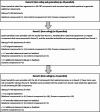Effective components of integrated motivational interviewing and cognitive behavioural therapy for lifestyle behaviour change: a modified Delphi study
- PMID: 41185033
- PMCID: PMC12581319
- DOI: 10.1186/s12966-025-01816-6
Effective components of integrated motivational interviewing and cognitive behavioural therapy for lifestyle behaviour change: a modified Delphi study
Abstract
Background: There are high levels of ill health across the world, largely due to lifestyle risk factors such as inadequate physical activity, unhealthy diet, and smoking. Behaviour change interventions are widely recommended for addressing many of these risk factors. While integrated motivational interviewing and cognitive behavioural therapy (MI-CBT) is increasingly used to support behaviour change, there is currently no established consensus on its core effective components. The aim of this study was to establish expert consensus on the essential elements of MI-CBT interventions for lifestyle behaviour change.
Methods: A modified Delphi study comprised of three iterative online surveys involving international experts in MI-CBT and lifestyle behaviour change was conducted. Using key literature and practice guides, a list of 63 commonly used components in individually delivered motivational interviewing (MI) and cognitive behavioural therapy (CBT) interventions were developed. In each round, experts rated their agreement with each component using a Likert scale. Components reaching at least 80% agreement in Rounds 2 or 3 were included in the final list of essential MI-CBT components.
Results: Thirty experts with a median of 13 years of experience in behaviour change intervention design and delivery participated in Round 1, with 28 (93%) completing Round 2, and 25 (83%) completing Round 3. Consensus was achieved for 26 components. Of these, eight were relational components which included open-ended questions, affirmations, reflections, summaries, emphasising autonomy and offering emotional support. Sixteen components were based on cognitive behavioural content, and included exploring change expectations, identifying and exploring avoidant behaviour, identifying past successes, and technical strategies such as activity scheduling and relapse prevention. Finally, two process components emphasised the importance of scheduling sessions flexibly based on client needs, and ensuring that the therapist meets recognised standards for MI-CBT training and practice.
Conclusions: Expert consensus was established regarding the essential elements of MI-CBT interventions for lifestyle behaviour change. This consensus provides guidance on essential elements to include in integrated MI-CBT interventions, which may strengthen MI-CBT training, improve intervention fidelity, and enhance real-world and research applications targeting physical activity, dietary intake, and smoking cessation. The proposed consensus framework offers a foundation for future trials assessing the effectiveness and implementation of integrated MI-CBT interventions.
Supplementary Information: The online version contains supplementary material available at 10.1186/s12966-025-01816-6.
Keywords: Behaviour change; Dietary changes; Health promotion; Physical activity; Smoking cessation.
Conflict of interest statement
Declarations. Ethics approval and consent to participate: Ethical approval was granted by the La Trobe University Human Research Ethics Committee (approval number HEC24066). Participants provided informed consent at the start of the first survey. Consent for publication: Not applicable. Competing interests: The authors declare no competing interests.
Figures
References
-
- Vaduganathan M, Mensah GA, Turco JV, Fuster V, Roth GA. The global burden of cardiovascular diseases and risk: a compass for future health. In., vol. 80: American College of Cardiology Foundation Washington DC; 2022:2361–2371. - PubMed
-
- Yach D, Hawkes C, Gould CL, Hofman KJ. The global burden of chronic diseases: overcoming impediments to prevention and control. JAMA. 2004;291(21):2616–22. - PubMed
LinkOut - more resources
Full Text Sources
Miscellaneous



